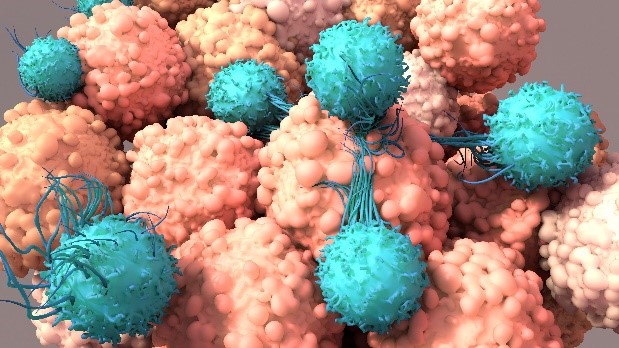Immunotherapy, also referred to as biological therapy, is a growing method for using the body’s own immune system to fight cancer. Immunotherapy can encourage and adapt how the immune system works so it can find and attack cancer cells. Immunotherapy stimulates the immune system to produce more disease-fighting immune cells.
The body has 2 main groups or systems of immune cells, innate and acquired. Innate immune cells are nonspecific immune cells designed to attack anything they sense as a threat. They produce a fast and effective immune response but are not very adaptable or targeted. The acquired immune system is a more specialized, systemic process to eliminate pathogens. The acquired immune system stores a memory of antigens it seen previously. When that specific antigen is recognized, the immune response is rapid and targeted. T and B lymphocytes go through a sudden cloning process, increasing from a few cells to millions. Each clone that originates from the original T or B lymphocyte has the same antigen receptor as the original, targeting the same specific pathogen.
In the early stages of cancer, the body’s immune system will recognize the abnormality as a foreign object and attack cancerous cells. As long as the body can control and kill the cancerous material, it is considered in the elimination phase. If the rate of the cancer’s growth begins to match or overpower the body’s immune system’s ability to naturally control it, it will move to the escape phase. At this point, the body’s immune system is unable to restrict tumor growth and tumor cells emerge causing clinically apparent disease.

The immune system can identify abnormal cells in the body in order to destroy them. Through this, the immune system can likely prevent or slow the growth of certain cancers.
In certain circumstances, however, cancer calls can avoid destruction by the immune system. Examples include when cancer cells:
- Have genetic variation or changes that can make them less likely to be seen by the immune system.
- Have proteins on or in them that turn off the immune cells.
- Change the healthy cells around a cancerous tumor, so that they obstruct the immune system’s response to cancer cells.
With immunotherapy, the immune system is strengthened and supported to better respond to cancer.
There are many types of immunotherapies that are currently used to treat cancer, including:
Immune Checkpoint Inhibitors
which include drugs that block immune checkpoints. Immune checkpoints allow immune responses to stay in a normal range and are normal parts of the immune system. By blocking immune checkpoints, immune checkpoint inhibitors allow the immune system and the cells within it to respond to cancer in a stronger way.
T-Cell Transfer Therapy
which strengthens the ability of your T-Cells to fight cancerous cells. In T-Cell Transfer Therapy, immune cells are taken from your body. Those that are best suited and most active against cancer are changed in a lab to be further strengthened to attack your cancer cells. These cells are then grown in large batches before being intravenously re-introduced to your body.
Monoclonal Antibodies
are lab-created immune system proteins that bind to specified areas of cancer cells. This allows them to be better identified and destroyed by the immune system.
Treatment Vaccines
fight cancer by strengthening your immune system and boosting its response to cancerous cells.
Immune System Modulators
enhance your immune system’s response to cancer. Options for immune system modulators include agents that affect only specific parts of the immune system or the entire immune system.
Immunotherapy functions by strengthening the immune system rather than acting directly on cancerous tumors as chemotherapy does. By strengthening the whole immune system in this way, immunotherapy can help to teach the body how to find and destroy future cancerous cells.
One of the biggest advantages in using immunotherapy is that it can potentially provide long-term defense against cancerous cells, as the immune system is trained to recognize and fight against cancer cells. Compared to chemotherapy, which is only effective if the drugs remain in a patient’s body, immunotherapy has the potential to provide long-lasting remissions for patients. When combined, there is evidence that chemotherapy can help to enhance the body’s immune response to some cancerous tumors, as well.
Immunotherapy’s strengthening of the immune system grants the potential to be effective against every type of cancer. Because of this, immunotherapy has made strides in the treatments of cancers such as bladder, breast, and colorectal cancer, and can often be used as the first line of defense.
Immunotherapy helps to strengthen the body’s immune system, rather than focusing on a specific tumor or cell type and can provide significantly impactful treatment for current cancers while preventing future cancers. Immunotherapy helps to strengthen the body’s ability to recognize and respond to cancerous cells, helping to rid your body of any current ones while training it to prevent the happenings of future cancerous cells as well.